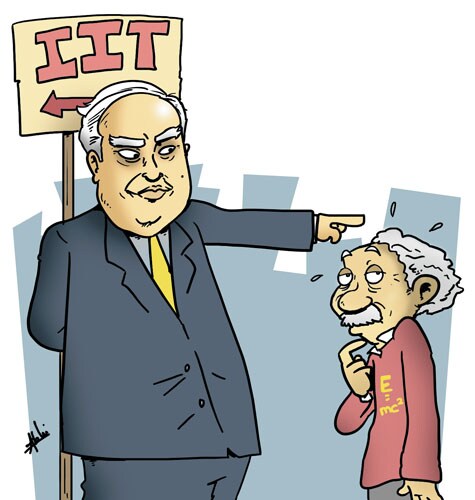
The Rule of 80
Students stake it all for an entry into the IITs. Will an 80 percent cut-off in the board exams act as a spoiler?
Abhisekh Kumar is an ordinary guy from Jamshedpur. He scored 76 percent in his 10+2 exams, dropped a year to prepare for the Indian Institute of Technology Joint Entrance Exam (IIT JEE) and cracked it in the first attempt. In 2006, Kumar graduated from IIT Bombay with a cumulative grade point average of 8.34 (maximum is 10), ranking third in his batch. He worked for a few years, didn’t like what he was doing, quit, and started eveningflavours.com, a Bangalore-based food & beverages portal, with three other IITian friends in February 2009.
Kumar’s career graph would have turned out differently had the cut off for IIT JEE aspirants been 80 percent in the 10+2 exam — a suggestion made earlier this month by Kapil Sibal, the Union Minister for Human Resource Development. Sibal suggested that students should score at least 80 percent (instead of the 60 percent required today) to be eligible to appear for the IIT JEE. This would ensure that they take their board exams seriously.
Three lakh people take IIT JEE every year; only 7,300 get through. Good marks in board exams would ensure that those who don’t clear have a back-up option.
But the minister should think again. Here’s why.
Education and testing standards vary wildly across different boards. “There is no normalised board exam in our country; the CBSE [Central Board of Secondary Education], ICSE [Indian Certificate of Secondary Education] and various other state boards have different standards. While some are easy, in other places like Uttar Pradesh, Madhya Pradesh and West Bengal, students struggle to get 70 percent. If this [80 percent cut off] has to come then the whole education pattern has to change,” says Prof. Anil Kumar, Chairman, JEE 2010, IIT Bombay. This is one of the reasons why the Birla Institute of Technology and Science (BITS) Pilani, switched over to an entrance test in 2005. Add to this, the dilemma of students from small towns and rural areas. They do not have access to good schools and hence secure low marks in board exams.
If the 80 percent rule comes into effect, it would destroy the absolute meritocracy that a JEE imposes. Most board exams test rote learning, while JEE tests logic and application of concepts. Says Vikram Singh, a 2006 pass-out of IIT Bombay, “One of my batch mates, who had scored just 62 percent in his 10+2 exam of the Madhya Pradesh Secondary Education Board, cleared the JEE exam in the first attempt. [While] another student, who was in the merit list (top 10) of 10th as well as 10+2 exams of Rajasthan Education Board could not clear the JEE exam even in two attempts.” It is this ability that allows IIT graduates to engage in solving complex engineering problems later. So why should the country lose a brilliant engineer? Mr. Sibal ought to rethink.
(This story appears in the 30 November, -0001 issue of Forbes India. To visit our Archives, click here.)





